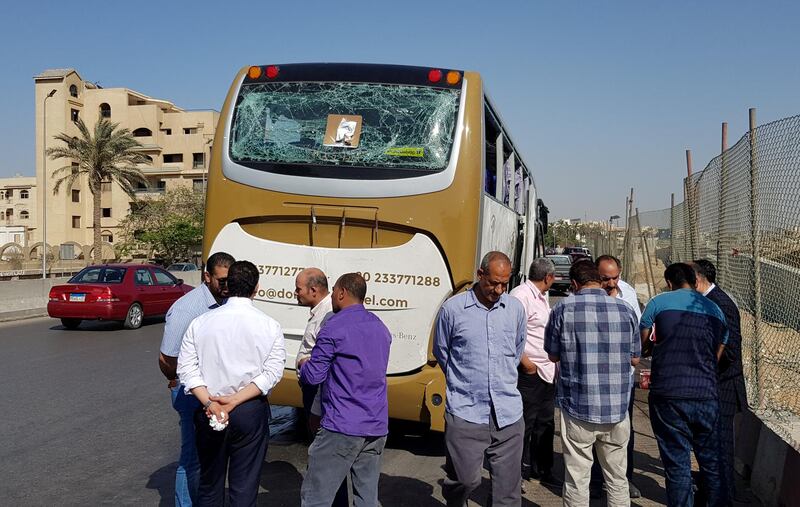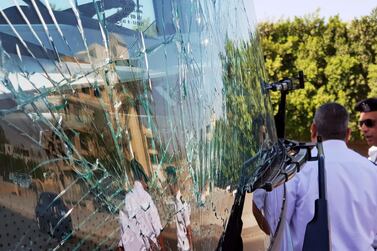Mindful of its vital tourism industry and determined to deny terrorists the publicity they so badly want, Egypt has responded to the weekend attack on a tourist bus in Cairo with a mix of force, charm and negligible media coverage.
At least 16 people, nearly half of them South African tourists, were injured on Sunday when a tourist bus was hit by an apparent roadside bomb as it travelled past the under-construction Grand Egyptian Museum near the Great Pyramids of Giza. No one was seriously injured in the afternoon attack, the second since December in that general area on the western outskirts of Cairo. The first attack killed three Vietnamese tourists and their Egyptian guide and injured at least 10 others.
On Monday, the interior ministry, which oversees the police, put out a statement saying security forces had killed 12 militants in two separate shoot-outs in Cairo suburbs where they were hiding. It said the militants belonged to Hasm, a group authorities say is an armed faction of the outlawed Muslim Brotherhood, an Islamist group from which Mohammed Morsi, the Egyptian president ousted by the military in 2013, hails.
There has been no claim of responsibility for Sunday's blast, but authorities have in the past blamed Hasm for a series of attacks in the greater Cairo area, including the shooting death of policemen.
Significantly, the interior ministry statement did not say when the shoot-outs took place or whether the militants killed by police were linked to Sunday's attack.
The ministry has in recent months issued similar statements the day after terrorist attacks, possibly to reassure Egyptians, and perhaps the world, that something was being done to prevent future attacks. Another thing common to these statements is that they report no arrests or injuries among the militants.
Beside Brotherhood breakaway factions such as Hasm, Egypt's security forces have for years been battling Islamist militants led by a local branch of ISIS in the Sinai Peninsula. Security forces have since last year stepped up operations against the Sinai militants, disrupting their network and destroying their infrastructure while preventing them from staging high-profile attacks.
However, attacks in Cairo, no matter how small or low the number of victims, tend to receive wide publicity abroad, something that affects the country's lucrative tourism industry now showing signs of recovery after years of slumping. Monday’s newspapers either published brief reports on the incident or ignored it altogether.
The interior ministry, meanwhile, has seen fit not to issue a statement on Sunday's attack as is customary in such cases, leaving state television to briefly report that a "strange object" exploded as a tourist bus with 25 people on board and a car with four Egyptian passengers drove by. The report made no mention of injuries.
Authorities have in the past decried what they said was the extensive coverage given by local and regional media to terror attacks in Egypt, with President Abdel Fattah El Sisi once saying that hours-long coverage, including repeating video clips from the scene of attacks, was not helpful.
This time round, the tourism ministry stepped forward with a statement clearly designed to play down the significance of the attack and showcase the government's concern for the welfare and safety of tourists.
It said Tourism Minister Rania Al Mashat visited the injured South African tourists in hospital to ensure that they were receiving adequate care for their "light injuries" and later accompanied some of them on a tour of the pyramids, with the area's antiquities chief as their guide.
Ms Al Mashat, a US-educated economist, later took the tourists back to their hotel to reunite them with the rest of the group, which left Cairo later on Sunday, the statement said.
In a tweet she posted on Sunday, Ms Al Mashat said the incident was caused by a "minor" explosion and that only three of the injured required treatment in hospital "as a precaution".
Today an incident took place in Giza involving a bus and a minor explosion. Of the 28 passengers on the bus we can confirm some minor injuries with three being treated at the hospital as a precaution. All of those involved are being fully supported in their onward travels. #Egypt
— Rania A. Al Mashat (@RaniaAlMashat) May 19, 2019
Egypt, the Arab world's most populous nation with about 100 million people, is counting on tourism as it tries to revive its battered economy. A foreign currency earner that employs hundreds of thousands, the industry was hard hit in the years of violence and political turmoil that followed a popular 2011 uprising that toppled the 29-year regime of autocratic ruler Hosni Mubarak.
A record 14 million tourists visited Egypt in 2010, but only 8.3 million did so in 2017, up from 5.3 million in the previous year. With Egypt widely seen as one of the world's most attractive destinations for 2019, the country is hoping to match the 2010 record or at least get close to it.







